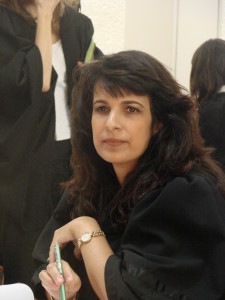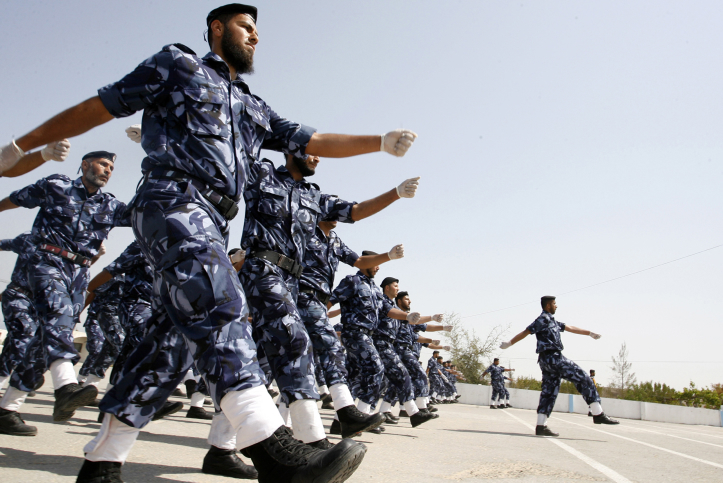Israel’s Attorney General and the Israeli Government are formally committed to fighting Hamas. So why are they preventing victims from getting compensation?
The best way to dismantle Hamas is through its wallet • Terror victims and their families have tried to do just that, filing civil suits for hundreds of millions of shekels against Hamas and the Palestinian Authority • But surprisingly, the obstacle standing in their way is none other than the Israeli government • The Attorney General says that “there are political considerations” and has repeatedly intervened in such suits • Confiscations were prevented, investigations sabotaged and deliberations unnecessarily drawn out • How the Government of Israel allows terrorism to continue to breathe

The terrorist attack against the Gavish family was one of the low points of the second Intifada. Only a day after the horrific Park Hotel bombing, an armed terrorist broke into the Gavish home. Finding the family sitting in their living room, the terrorist sprayed bullets and shed blood. The two parents, David and Rahel, the son Avraham and the grandfather Yitzhak were killed on the spot. The other six members of the family, also home at the time, ran upstairs, hid on the second floor and were eventually evacuated via a ladder while the terrorist fought with security forces on the ground floor.
The murder shocked the whole country, and was one of the factors which drove then Prime Minister Ariel Sharon to order Operation Defensive Shield, designed to crush the Palestinian Authority and its terrorist mechanisms. Meanwhile, the six surviving family members decided to go the legal route and sue Hamas and the Palestinian Authority for 176 million shekels in compensation.
“The money won’t let us get over what we’ve lost. It can’t make up for the loss, it only makes it greater. It can’t be exchanged for money,” said Naama Gavish, after an Israeli court ruled in their favor in 2006 and established 90 million shekels to be paid in compensation. “We filed the lawsuit to try and stop the Hamas,” Naama said then, “in order to prevent them from hurting more families […] like they did to us.”
The Attorney General Prefers Hamas

But, as it turns out, Naama spoke too soon. To win a verdict against a terror organization is one thing, to go out and collect the money is quite another. Since confiscating Hamas assets in Gaza or in Arab states is not possible, Advocate Nitzana Darshan-Leitner, head of “Shurat Hadin” which was representing the family, asked to put Hamas companies into their receivership, something which would allow in-depth investigation of Hamas finances in Israel, which is funneled through various Islamic charity organizations.
The idea was feasible, being based on various precedents of terror victims filing similar lawsuits in the United States and elsewhere. Aside from providing the victims’ families with their compensation, such a move has huge political ramifications, allowing, for the first time, terror victims to directly “drain the swamp” of terrorist finances.
It therefore came as quite a shock when it turned out that the person blocking this move was none other than then Attorney General Meni Mazouz. Mazouz argued that the lawsuit must be set aside because “the right of the State of Israel or a public interest may be affected or involved in the process before the Honorable court.”
In a paper submitted to the court, the following contorted argument was made: “A terrorist organization, Hamas in our case, is a body outside the law, which has no right to exist and has no rights whatsoever.” In this framework, the state was given a variety of powers to ensure that “this illegal body ceases to exist, among others by confiscating its property…any Hamas property located by the state will be confiscated for its benefit, and any use of Hamas property is prohibited.”
Because of this, terror victims and their families wishing to use said property for compensation are “trying to bypass [the state] when it comes to the property [of Hamas], to the extent it exists in Israel, and to bypass prohibitions and results deriving from the declaration of Hamas as a terrorist organization.”
In plain English: the State is the one which acts against Hamas and its funding operations and there is no need for anyone else to be involved.
But given that the State doesn’t actually confiscate Hamas property in Israel, this answer is curious, to say the least: “You yourself aren’t fighting them, so why don’t you let terror victims do so?”, asks Darshan-Leitner, “Why not deprive Hamas of its assets? What interests do you have? The last thing you expect from the Israeli government or its Attorney General is that they’d end up standing on the side of Hamas.”

Not Prosecuting Terrorism
According to her, this is a consistent policy: “The American State Department and the Israeli Foreign Ministry don’t take kindly to these lawsuits,” she says, “because they damage their diplomatic efforts to arrive at peace or understandings with terror-supporting countries and terrorist organizations.”
Over the last decade, Darshan-Leitner and her organization have filed dozens of lawsuits against terrorist organizations in Israeli courts and in the United States. According to the organization’s data, these lawsuits – filed against Iran and Syria in addition to the Palestinian Authority and Hamas – have resulted in favorable verdicts adding up to over a billion dollars, 120 million of which have actually been collected and given to the victims. According to Darshan-Leitner, the ones obstructing collection of the compensation are the diplomatic bodies of both states.
Unfortunately, “Shurat Hadin” has had many opportunities to see just how feeble Israel’s financial effort against Hama really is. In a lawsuit filed by one the victims of the Tel Aviv Dolphinarium suicide bombing, Darshan-Leitner demanded that Israel commandeer tax revenues which Israel collects for the Palestinian Authority, which come to about 250 million NIS. Such an act, which is easy for Israel to do as the money is in its hands, would make collection easier if and when the court finds in favor of the victim.
Yet here, too, the Attorney General decided to intervene: “the plaintiffs’ argument must be dismissed,” it was stated in a message on his behalf, arguing that “in the framework of the entirety of considerations which need to be taken into account is the public general systemic one,” which in this case “is of an explicitly political character, and on an issue of very high sensitivity, which needs to be examined daily according to developments, and the knowledge for this constant examination is held by the relevant government agencies involved in them.” Therefore, according to him, “policy considerations justify granting decisive weight to government decisions on the question of when and why to transfer money to the Palestinian Authority. At the core of this argument stand considerations of foreign relations and explicitly political considerations.”
In another case, the Attorney General tried to sabotage a discussion with the strange technocratic argument that “evidence taken from Jewish settlers in military courts operating in the West Bank…Israeli law does not apply there and does not grant it its authority. Therefore [Israeli] military courts are in fact a foreign court on this issue.”
According to Darshan-Leitner, this is nothing short of absurd: “The Attorney General is the one who refers terrorist cases to military courts, in order to relieve the burden on the system. Thus we have a case of double standards: if a victim’s terrorist happens to be tried in district court, a guilty verdict there can serve as evidence (in civil court) while this is denied others whose case comes before a military court.”
The absurdity is even greater in light of the fact that the separation between the two systems is a formality; in fact, judges are often active in both systems: “These are the same people who serve as judges on reserve duty, and they use the same rules and laws, even if formally the source of authority is different.” Two years ago, the Attorney General’s objection was rejected by the Supreme Court, and the case is still pending.

Continuing to Cover for Terrorism
The Palestinians were quick to learn the trick, and its own lawyers harp repeatedly on the political angle. Thus for instance, Adv. Yossi Arnon, representing the PA, responded thus in one such case:
In the event the Palestinian Authority is forced in the end to pay the plaintiffs in various cases significant sums of money […] This may with high probability bring about the collapse of the already shaky financial system of the Authority, and this situation can have difficult and direct consequences for the State of Israel as well.
It’s important to stress that in most cases legal official don’t act this way on their own. It is an expression of Israeli government policy, which prefers to maintain the present terrorist organizations, in the false hope that they can be “moderated” and be brought to an “understanding” with Israeli authorities. Easier to do this than take responsibility and actually work to crush the terrorist enemy.
Tzipi Livni provided clear proof of this policy when she was Foreign Minister. In the winter of 2007, the Minister avoided submitting to the court her “Foreign Minister ID” which was necessary to continue to the court’s deliberations, thus creating an unnecessary delay of half a year in the lawsuit filed by some 12 terror victims. Livni’s conduct was so problematic, that after the expiration of an extension and innumerable appeals and correspondence, Darhsan-Leitner appealed to the court arguing for contempt of court, demanding that the Minister obey the order for her ID under penalty of “a fine, or imprisonment.” Only then did the Minister obey the order.
“You would think that it’s in Israel’s interest to destroy terrorist infrastructure and the money pipelines that fund it,” Darhsan-Leitner summed up. “The State of Israel should support and encourage these efforts, and here we see that they don’t. No-one’s forcing the Attorney General to show up at these proceedings and he chooses to show up, and thus defeating these proceedings.”
“The shocking event which ended yesterday (the kidnapping and murder of the three hitchhikers) shows how determined and fierce the struggle the war against terror and terror finance needs to be,” she says. “The interest of the state needs to be synonymous with that of its citizens: not to fall victim to the acts of an organization whose murderous acts are only made possible by the funding it receives.”
English translation by Avi Woolf.
To receive updates on new articles in English, join Mida on Facebook or Twitter or join our mailing list.




“AS POGO said -when parodying the famous statement of Commodore Oliver Hazard
Perry on the War of 1812- “We have met the enemy; and he is us”
This is shocking about the Israeli attorney General and his appeasement of Hamas.
Thanks for posting this important article.
Labor, Livni and Meretz should change their platform to we support Arab murderers of Israeli civilians
As Steven Plaut documented.
In 2012, an initiative was begun in the Knesset led by David Rotem (from the Yisrael Beitenu party), to cut the stipends and pensions paid to convicted Palestinian murderers and terrorists by 50%. That is correct – the Knesset was only one-half working against welfare support for terrorists, by preserving only half of the stupidest idea in human history.
Rotem wanted to eliminate the Paychecks for Terrorists Program altogether but there was too much opposition from the rest of the Knesset and the government’s pin-headed lawyers. Israel’s Ministry of Justice bureaucrats opposed any reduction in the welfare benefits for the mass murderers. It would be unjust, you see. Insensitive to the needs of the families of the terrorists. The Israeli Left denounced the initiative as “anti-democratic.”
What is amazing is that the Israeli Left voted against the bill. How dare anyone deny terrorists and their families the benefits of Israeli welfare payments! Meretz and Amram Mitzna voted for the terrorists. Mitzna is now a member of Tzipi Livni’s party. The Israeli Labor Party voted against the bill, showing that its electoral strategy seems to be to challenge the ultra-leftist Meretz party over which party will attract the most votes from the treason constituency.
The way in which Israel’s highest courts seem to act against the people of Israel is a deeply shocking thing to we Gentiles who love Israel, and long for her full and complete restoration. It is a mystery to us. I can only conclude that the values of secular humanism, which so deeply pervade the western world, consequent to the Wests rejection of her Judaeo Christian roots, also pervade the thinking of Israel’s judges.
It would therefore appear that a deep cleansing of Israel’s courts is required, to restore them to the authentic values of Torah. Torah clearly mandates the full equality of all under the law, so it is therefore to Israel’s glory that she protects the foreigners in her midst. However Torah makes no provision for those foreigners who would destroy the nation.
In my opinion, this is where the courts of Israel are in deep error. they fail to distinguish between those foreigners who simply wish to get on with their lives in the midst of Israel, and those who wish to destroy her, There needs to be fundamental change in
the courts, if Israel is not to destroy herself from within. Shalom from the UK. C.